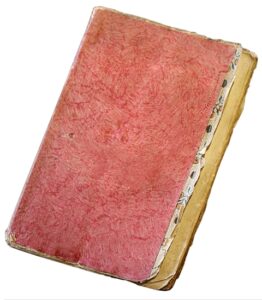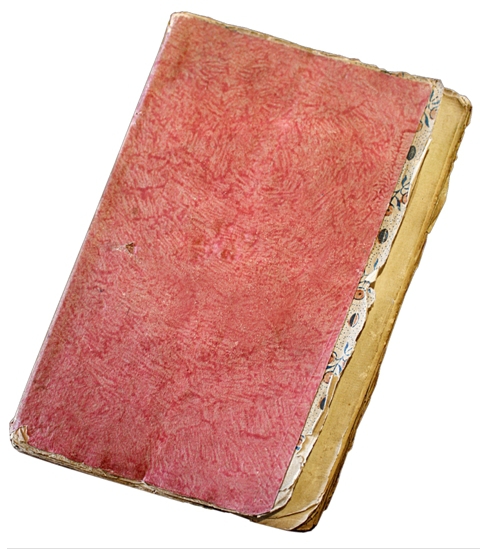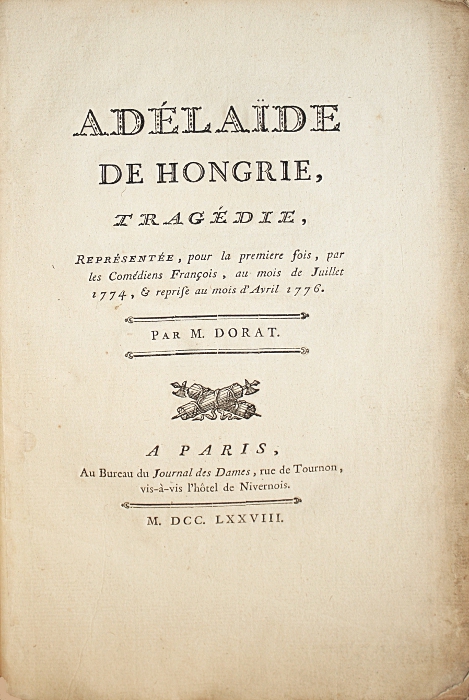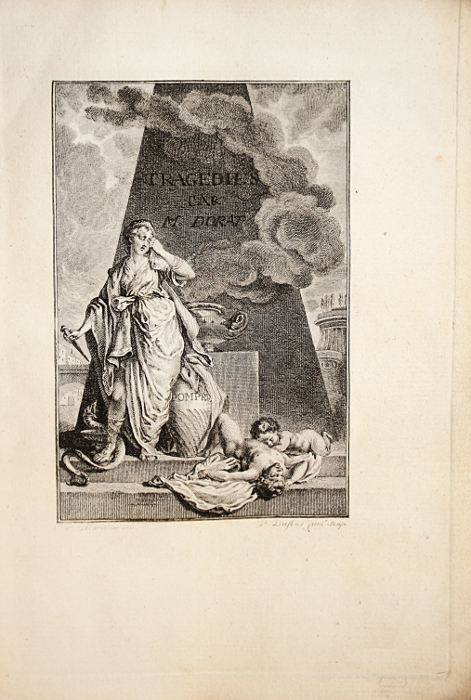Paris, Bureau du Journal des Dames, 1778.
Large 8vo [232 x 150 mm] of (1) title l., 1 engraved frontispiece, ii pp., 156 pp, one engraving in two state. Outer margin of the title l. slightly soiled. Untrimmed, uncut. Preserved in its contemporary pink wrappers, small lacking at the head and foot of spine. Contemporary wrappers.
Second edition, entirely revised and corrected by the author, of Adélaïde de Hongrie, a tragedy by Dorat, illustrated in first state with an engraved frontispiece and a superb engraving by Marillier in two state. Cioranescu, 25170; Quérard, La France littéraire, 576.
As mentioned by the title of the work, this play has been performed since July 1774. The author wishes here to present a new version of his play as he wants to be consistent with the performances since “considerable changes” have been made. This new edition is “absolutely different from the first one. The end of the third Act had never been printed. The fifth one is absolutely changed.” Besides, the work is decorated in first state with a frontispiece and an engraving in two state by Marillier, one of the best drawers of his time. Moreover, this edition is different from the first one for / with its elegant ornamental heads, fleurons and tail-pieces.
“Claude-Joseph Dorat, musketeer of the King, known in literature since 1758, was born in 1734, and dies in Paris in 1780. […] After Voltaire, nobody nowadays better achieved light poems; he made of this kind a large number of pleasant works, to which ordinarily it only lacks more respect for wisdom and more virtue.” (F.-X. de Feller. Biographie universelle. II, p. 598).
“We know the legend of Pepin’s wife, that a chanson de geste of the third quarter of the 13th century saved us, ‘Berthe aux grans piés [Bertha Broadfoot]’, reworking of a previous text. In this poem, a work by Adenes Le Roi, Bertha, daughter of the King of Hungary, replaces Aliste, daughter of the serf Margiste, during the wedding night. Then she is accused by the same Margiste of having planned to kill the false queen, is condemned to death but finally abandoned in the woods. Received by Simon, a king’s officer, she spends peaceful days with the loyal servant’s wife and his daughters. Blanchefleur, Bertha’s mother, discovers Aliste’s masquerade: Margiste is burnt down, Aliste is locked up in a convent, Bertha is found and crowned. […] And yet Bertha’s history is still known in the 18th century […]. Not only the work has entered into the ‘Bibliothèque universelle des romans’, but it was the subject of two, or rather three dramatic adaptations. One, ‘Berthe’ (1774) is due to Regnard de Pleinchesne, the two others to a prolific author, a contemporary of Voltaire, Claude-Joseph Dorat: there are ‘Deux Reines’ (1770) and ‘Adélaïe de Hongrie’ (1774, reworked in 1778). If Pleinchesne’s work is worth for the curiosity, the two versions proposed by Dorat interest for the research, through drama or tragedy, of modern equivalents of the epic.” (D. Boutet et C. Esmein. Palimpsestes épiques, p. 129).
“There are two Editions; one in small 8vo, the other one in a slightly larger format, & of a thicker paper.” (Notice)
A precious copy, one of very few printed in large 8vo format and on large paper, preserved untrimmed and uncut as published, in its contemporary wrappers.
Dorat was encouraged in his literary work by Crébillon father and if his plays hardly had success on the Parisian stages, the author remains dear to the bibliophiles’ heart since “his least opuscules were edited with an incredible care, with a probably ruinous luxury. They were embellished and illustrated with engravings, copper-engraved vignettes that would make the abbé Galiani say: ‘This poet saves himself from sinking plate after plate’.”
Provenance: Jean Furstenberg’s ex libris.




